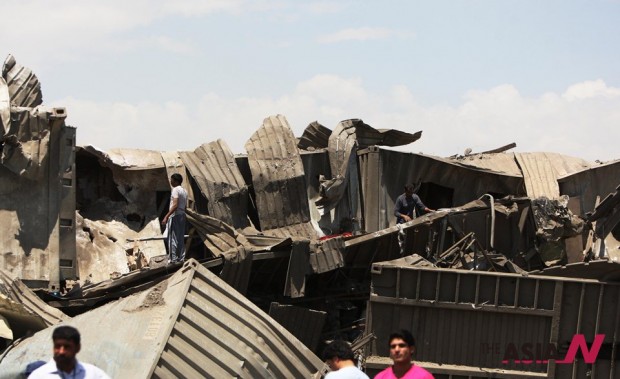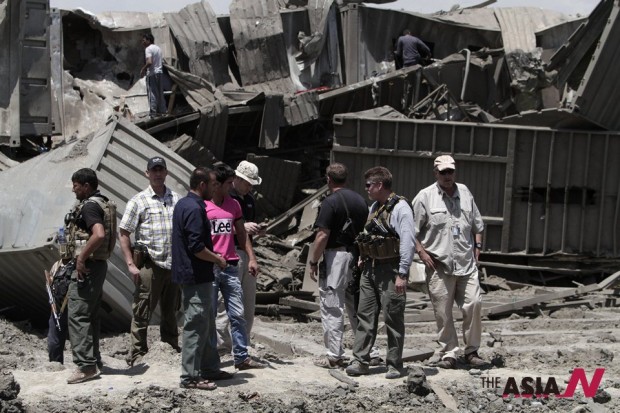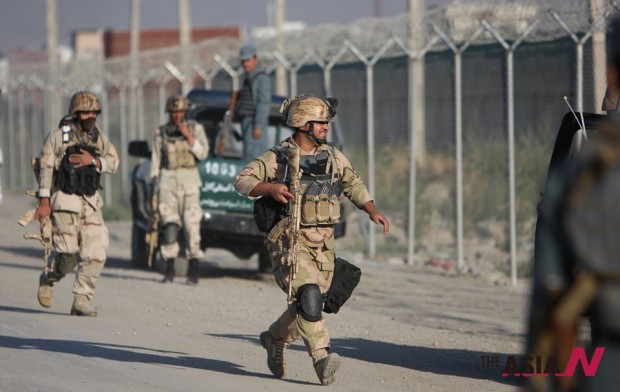
12 dead in Afghan Taliban’s suicide attack on NATO supplier’s compound

A suicide truck bomber followed by heavily armed men stormed a NATO supplier’s compound Tuesday in Kabul, prompting a gunbattle that left a dozen people dead in the latest Taliban attack on a high-profile target in the Afghan capital.
The bold strikes have signaled the Islamic militant movement has no plans to suspend its campaign of violence even though they have agreed to embark on a U.S.-led peace process.
The violence began before dawn when the bomber drove a small truck packed with explosives to the outer gate of the logistics center used to supply NATO troops and detonated it, said Kabul provincial police chief Mohammad Ayoub Salangi. The explosion left a huge crater in the ground and damaged a guard tower.
Two truck drivers waiting to enter the compound were killed in the blast along with the bomber, he said. Then four gunmen stormed into the breach and battled with security guards and an Afghan police special response team for about an hour. The attackers were all killed, along with one Afghan and four Nepalese security guards, the Interior Ministry said in a statement.

The British government confirmed that a U.K. national had been killed in the attack, but it could not say whether the victim was one of the truck drivers or a security guard or contractor.
The Taliban opened a political office in the Qatari capital of Doha last month, indicating they were prepared to enter into Afghan peace talks, an effort that has taken on added urgency as the U.S. and its allies prepare to withdraw combat forces by the end of next year. But the movement did not renounce violence.
“This (attack) has no link to the peace process,” Taliban spokesman Zabiullah Mujahid told The Associated Press in a telephone call, promising that attacks “will continue all over the country occupied by the foreigners.”
Mujahid also said only three militants were involved in the “attack on a big foreign base important for NATO logistics,” listing the assailants by name, according to a statement on the Taliban website.
The Taliban have persisted with their campaign of violence since opening the Doha office on June 18. The next week, suicide attackers got past preliminary security checks and opened fire on guards at a gate to the presidential palace in the heart of Kabul. Heavily armed fighters also launched a failed assault on NATO’s operational headquarters at Kabul’s international airport and detonated a car bomb outside Afghanistan’s Supreme Court earlier that month.

The U.N. deputy chief, Jan Eliasson, who was in Kabul wrapping up a five-day trip to Afghanistan when Tuesday’s attack hit, said continued violence could only harm the Taliban’s own cause.
“I would hope that there would be steps taken by the leadership of the Taliban to realize that the tool of violence in any case cannot instill confidence in the population,” he said. “There’s been too much suffering there, and there are too many widows, too many father-and-motherless children in Afghanistan.”
The Taliban have refused to negotiate with President Hamid Karzai’s government in the past, saying the U.S. holds effective control in Afghanistan, but the Americans are hoping to bring the two sides together.
The possibility of peace talks got off to a rocky start, however, after the Taliban opened the Doha office under the name “Islamic Emirate of Afghanistan” and the flag it used while ruling Afghanistan. Karzai and other Afghans reacted sharply to the move, saying that agreements had been violated and that the office was more akin to a rival embassy than a bureau for peace negotiations.
The Taliban have since been forced to remove the offending flag and sign, but talks have yet to begin.
Eliasson said the U.N. would be happy to help start the process, but only if requested by the Afghan government.
“The reconciliation process must be, if it is to be successful, Afghan-led,” he said, hoping for direct contacts between the parties. “As long as those contacts continue, there’s no specific need for the United Nations to be involved.”
Also Tuesday, in the eastern province of Paktika, local police commander Azizullah Karwan said six Taliban militants were killed in a clash with one of his patrols.
He said no police suffered casualties.
In Ghazni, the neighboring province to the west, three policemen were killed and three wounded in a gunbattle with the Taliban around midday, district police chief Kasim Desiwal said. Four Taliban fighters were killed, he said. <AP/NEWSis>


